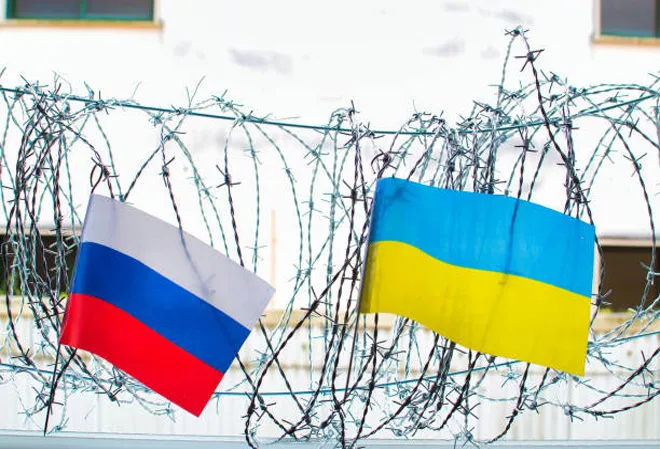-
CENTRES
Progammes & Centres
Location
Ukraine is astutely engaging in lawfare to undermine the legitimacy of Russia’s claims. India could follow suit and deal with its security challenges in a similar way.

It has been almost 10 months since Russia, a nuclear power, illegally invaded Ukraine, a non-nuclear state. Since then, the Russia–Ukraine war continues to rage and seems to have taken an ugly turn after the burning of the bridge that linked the Russian-control Crimean Peninsula with Russia earlier in October. Subsequently, Russia has stepped up military hostilities in Ukraine including drone attacks on civilian infrastructure in Kyiv. Ukraine is resolutely responding to Russia’s attacks.
However, Ukraine’s fight against Russia is not limited to a military battle. Ukraine is also fighting Russia in several international courts, a fact that has received scant attention. In fact, Ukraine’s battles in the courtrooms date back to Russia’s illegal annexation of Crimea in 2014. Ukraine’s legal confrontation with Russia is part of the former’s strategy called lawfare. Lawfare is a term introduced in the international law vocabulary by Charles J Dunlop, an American soldier-turned-law professor. Dunlop defines lawfare as “the strategy of using—or misusing—law as a substitute for traditional military means to achieve an operational objective.” Refining it further, other commentators have described lawfare as a strategy of using legal means to put pressure on one’s military adversaries by opening several fronts with the view to accomplishing strategic or political objectives. Lawfare is construed as a value-neutral term where the law can be both used and misused to accomplish strategic objectives. China and Russia have been making unethical use of lawfare by weaponising laws against their opponents to achieve their political and strategic objectives.
Dunlop defines lawfare as “the strategy of using—or misusing—law as a substitute for traditional military means to achieve an operational objective.”
Unlike China and Russia, Ukraine’s lawfare is ethical, whereby it is making use of multiple international courts against Russia to achieve manifold critical objectives all aimed at exposing Russia’s illegal war. First, Ukraine is projecting itself as the victim state and exposing the belligerence of Russia as an aggressor, breaching international law across several domains. Second, Ukraine wishes to open several legal fronts against Russia forcing the latter to spread its resources thin in defending these claims and thus escalating the cost for Russia. Third, Ukraine is using all legal levers available to hold Russia accountable for its actions under international law, and thus, mount pressure on Kremlin to stop the war. There are at least five international law forums that Ukraine has simultaneously activated against Russia.
First, subsequent to Russia’s illegal annexation of Crimea, Ukraine brought a claim against Russia before the International Court of Justice (ICJ) in 2017. Immediately after Russia’s invasion of Ukraine in February this year, the latter moved the ICJ yet again this time accusing the former of breaching the Genocide Convention. Ukraine managed to obtain an order from the ICJ that Russia should immediately halt its military actions against Ukraine till the time the court decides on the issue of the breach of the Genocide Convention. However, Russia hasn’t complied with this order, which it is bound to comply with as per Article 94(1) of the UN Charter, and has continued its military offensive.
Second, Ukraine has also moved the Strasbourg-based European Court of Human Rights (ECtHR) against Russia filing multiple petitions since 2014. The latest one is Ukraine v. Russia (X) filed after the Russian invasion of Ukraine in February this year. Ukraine alleges massive human rights violations committed by Russian troops in Ukraine. The ECtHR in March indicated to Russia to refrain from military attacks against civilians and civilian objects. Russia hasn’t given two hoots about the ECtHR ruling either and continues targeting civilians with the latest drone attacks in Kyiv being the most recent example.
Ukraine managed to obtain an order from the ICJ that Russia should immediately halt its military actions against Ukraine till the time the court decides on the issue of the breach of the Genocide Convention.
Third, the Hamburg-based International Tribunal of the Law of the Sea is also busy dealing with a case brought by Ukraine against Russia. This case is based on Russia detaining three Ukrainian naval vessels. Ukraine alleges that Russia has breached its obligations under the United Nations Convention on the Law of the Sea.
Fourth, another Hauge-based court, the International Criminal Court (ICC), is also involved in the Ukraine-Russia conflict. Although Ukraine is not a signatory to the Rome Statute that created the ICC, Ukraine has accepted the court’s jurisdiction through a declaration under Article 12(3) for war crimes taking place on Ukrainian territory from 20 February 2014 without any temporal limitation. Consequently, the ongoing conflict with Russia is also covered.
Fifth, Ukraine has been backing its companies to make use of the Investor-State Dispute Settlement (ISDS) mechanism under the 1998 Ukraine-Russia bilateral investment treaty (BIT) to challenge Russia’s seizures of Ukrainian companies in Crimea. The ISDS provision in a BIT can be used by a foreign investor against the other state, not its own. The Ukrainian companies in Crimea find themselves in territory occupied by Russia. Thus, they have invoked the BIT against Russia and cleverly used the international law of occupation before ISDS tribunals to expose Russia’s blatant illegality.
Ukraine has been quite successful in this strategy. A large number of countries are backing Ukraine’s quest to hold Russia accountable at multiple judicial forums such as the ICJ, ECtHR, and the ICC.
India should mount an international challenge against China for consistently breaching several bilateral treaties that the two sides have signed for border peace.
India can take a leaf out of Ukraine’s lawfare book in dealing with the security challenges it faces from its neighbours. For instance, India should use international law to hold Pakistan accountable for various actions such as sponsoring terrorism and illegally snapping bilateral trade post the dilution of Article 370. Likewise, India should mount an international challenge against China for consistently breaching several bilateral treaties that the two sides have signed for border peace. The larger strategic and political objective behind this should be the following. First, to show that China and Pakistan are acting in breach of international law and thus their actions are illegitimate. Second, to put pressure on China and Pakistan to stop their actions that hurt India’s national and security interests. Third, to force China and Pakistan to respond to the allegations of breaching international law and to allow the global community including international courts to hold them accountable for their illegitimate actions.
However, the successful use of lawfare requires two indispensable requirements. First, enormous state capacity in the area of international law, which India lacks because generalist diplomats and international relations experts set the narrative on foreign policy. Second, a clear and long-term vision to deal firmly with adversaries like China by courageously taking them on at all forums. This requires a paradigm shift in the conduct of international relations. Is India game for it?
The views expressed above belong to the author(s). ORF research and analyses now available on Telegram! Click here to access our curated content — blogs, longforms and interviews.

Prabhash Ranjan is Professor and Vice Dean (Continuing Education) at Jindal Global Law School O P Jindal Global University Sonipat. ([email protected]) Views are personal.
Read More +